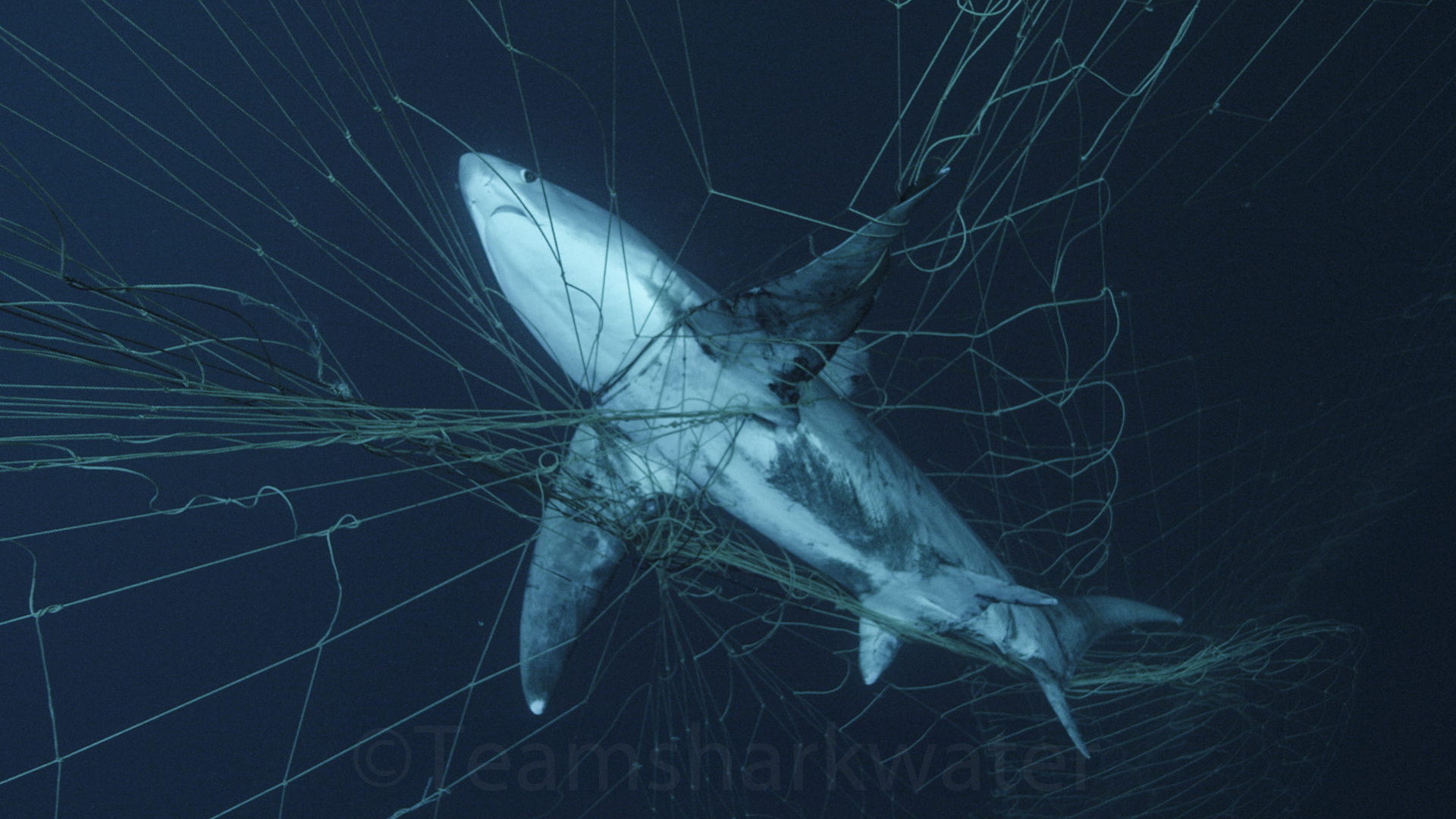
Recently reintroduced legislation would phase out last remaining drift gillnet fishery in the United States, an fishing technology used to catch sharks and swordfish but also trap and kill more than 70 different species of ocean wildlife.
Legislation would phase out last remaining drift gillnet fishery in the United States
WASHINGTON—Congress reintroduced a pair of bipartisan bills recently that would phase out the use of harmful large mesh driftnets off the coast of California, the only place the nets continue to be used in the United States. Large-scale driftnets, also known as “death nets,” are used to catch sharks and swordfish but also trap and kill more than 70 different species of ocean wildlife.
“The driftnet fishery is responsible for widespread destruction of marine wildlife,” said Executive Director Todd Steiner. “Turtle Island Restoration Network is buoyed by the timely action of Congress to throw a lifeline to threatened whales and dolphins that are cruelly drowning in the driftnet curtains of death.”
Large mesh driftnets, which are more than a mile long, are left in the ocean overnight to catch swordfish and thresher sharks. Other marine species, including whales, dolphins, sea lions, sea turtles, fish and sharks, can also become entangled in the large mesh nets, injuring or killing them. Most of these animals, referred to as bycatch, are then discarded. The use of large mesh driftnets by a single fishery in California is responsible for 90 percent of the dolphins and porpoises killed along the West Coast and Alaska. At least six endangered, threatened, or protected species are harmed by driftnets off the California coast.
Last year, California passed a four-year phase out of driftnets in state waters to protect marine life. The recently reintroduced Driftnet Modernization and Bycatch Reduction Act (S. 906) and its companion bill, H.R. 1979, would extend similar protections to all federal waters within five years and authorize the National Oceanic and Atmospheric Administration to help fishermen transition to more sustainable nets.
“Driftnets meant for swordfish and thresher sharks off the coast of California are actually harming and killing more than 70 different species of ocean wildlife,” said Steiner. “This legislation would be the final nail in the coffin for eliminating this antiquated and unsustainable fishing technology.”
In the United States, large mesh driftnets are already banned in the Atlantic Ocean and Gulf of Mexico, as well as off the coasts of Washington, Oregon, Alaska and Hawaii. However, they remain legal in federal waters off the coast of California. The United States is also a member of international agreements that ban large-scale driftnets in international waters.
The bills were introduced by Senator Dianne Feinstein (D-Calif.), Senator Shelley Moore Capito (R-W.Va.), Congressman Ted W. Lieu (D-Los Angeles County), and Congressman Brian Fitzpatrick (R-PA).
“California took the important first step to protect marine animals from large mesh driftnets off our coast and it’s imperative we now extend those protections into federal waters,” Senator Feinstein said. “It’s heartbreaking that a single California fishery using this type of driftnet is killing more dolphins and porpoises than all other fisheries along the West Coast and Alaska combined. Our bipartisan bill will remove these harmful nets from all of California’s coastal waters and facilitate more sustainable fishing methods.”
“Drift gillnet fishing is an unsustainable, unnecessary method of catching swordfish and sharks,” Representative Lieu said. “Taking care of our oceans by stopping this harmful practice will be essential if we want to mitigate and reverse damage to critical marine ecosystems. California has already taken an important step in banning drift net fishing in state waters, and it’s time for the Federal government to follow suit.”
Turtle Island Restoration Network has led a coalition of concerned citizens and partner organization for nearly 20 years, working to stop the devastating impact of this driftnet fishery on sea turtles, whales, dolphins, and other ocean animals. Last year, Turtle Island Restoration Network worked with several conservation groups—Sea Legacy, Sharkwater, and Mercy for Animals—to release undercover footage under the campaign “Ban Death Nets” to show the impact fishing driftnets can have on marine life.
“We’re very encouraged by Senator Dianne Feinstein’s proposed legislation,” said Paul Nicklen, co-founder and expedition lead for SeaLegacy. “This is the kind of leadership we need to see if necessary changes to the driftnet fishery in the waters off California are going to happen. Witnessing what happens in the waters off the coast of California has been one of the most devastating experiences of my entire career. This development gives us hope for a better future.”
More information on the driftnet fishery and photos for media are available on Turtle Island Restoration Network’s website at www.seaturtles.org/campaigns/ban-california-driftnets/.
FOR IMMEDIATE RELEASE: April 2, 2019
Press Contact: Rebekah Staub, Communications Director, rstaub@seaturtles.org, (720) 988-5779




